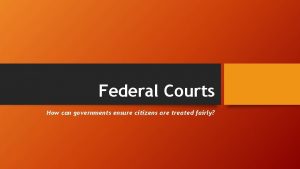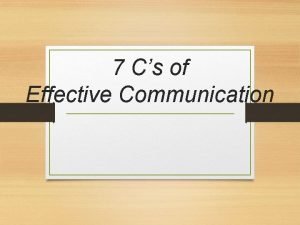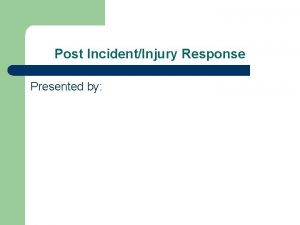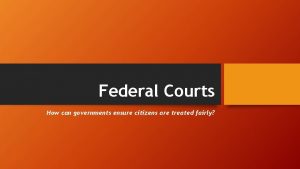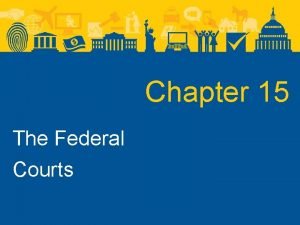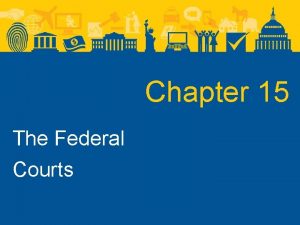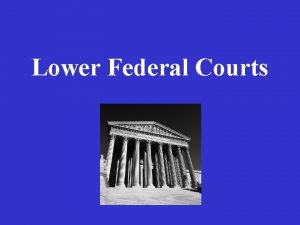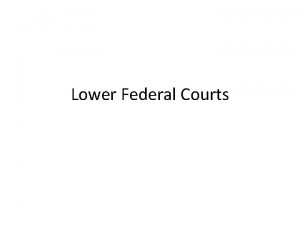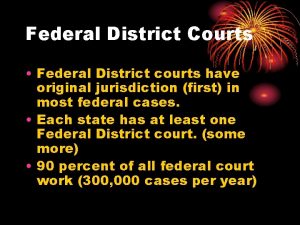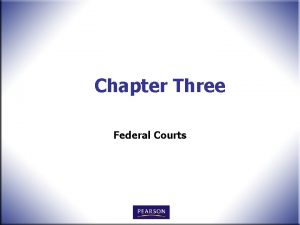Federal Courts How can governments ensure citizens are










- Slides: 10

Federal Courts How can governments ensure citizens are treated fairly?

Role of the Federal Courts judicial branch of government = courts 2 main jobs. 1. tries to ensure that the laws are fairly enforced. 2. interprets the laws. Courts hear 2 types of cases: 1. criminal cases - people accused of crimes appear in court for a trial • witnesses give evidence • jury or a judge decides on a verdict of guilty or innocent. 2. civil cases - between parties who feel that their rights have been harmed.

Three Kinds of Civil Disputes 1. between two private parties (people, companies, or organizations) 2. between a private party and the government 3. between the U. S. government and a state or local government or between state governments.

Origin of the Federal Court System Judiciary Act of 1789 -established 2 types of lower federal courts: district courts and circuit courts. 1. district courts served as trial courts for distinct geographic regions. -minor civil and criminal cases. -(trial courts) 2. The circuit courts took more serious cases and heard appeals from the district courts -The 13 circuit courts in the middle are appeals courts. -The Supreme Court, the court of final appeal, is at the top.

Dual Court System The United States has a dual (2) court system. 1. federal courts • Federal courts get their powers from laws passed by Congress. 2. 50 separate state court systems. - Each state has its own laws and courts. • The state courts get their powers from state constitutions and laws.

Federal Court Jurisdiction Article III of the Constitution gives federal courts jurisdiction—the authority to hear and decide a case

Admiralty and Maritime Laws Admiralty and maritime laws concern crimes, accidents, and property at sea. • example, two parties might disagree over which of them has the right to property recovered from a shipwreck. • That case would be handled in federal court.

The Federal Government The government is not above the law. • When the government is part of a legal dispute, the matter goes to federal court. • For example, the government might sue a company for failing to deliver goods as promised in a contract.

Cases with Foreign Governments and U. S. Diplomats Any dispute between a foreign government and the U. S. government goes to federal court. • Also, if American officials at work in another nation are accused of a crime, this is a federal case.

Types of Jurisdiction Sometimes, though, either a federal or a state court could hear a case. In that situation, the two courts are said to have concurrent jurisdiction. For example, either court may try someone accused of committing a crime that breaks both state and federal law. • The same is true when citizens of different states have a dispute with a value of at least $75, 000. • In such a case, the person who brings the suit can choose either a federal court or a state court. • The person being sued has the right to insist on the case being heard in a federal court, though.
 How can governments ensure citizens are treated fairly
How can governments ensure citizens are treated fairly Mikael ferm
Mikael ferm Harmony in self and body
Harmony in self and body Governments can sometimes improve market outcomes examples
Governments can sometimes improve market outcomes examples Ulsen one-touch-support.com
Ulsen one-touch-support.com Powder actuated tool safety
Powder actuated tool safety It implies emphasizing on specific message or goal at time
It implies emphasizing on specific message or goal at time '+elderly +ensure
'+elderly +ensure What are the criteria for being a conscious marketer
What are the criteria for being a conscious marketer Akrodermatitis enteropatika oral destek
Akrodermatitis enteropatika oral destek Purpose of ensure
Purpose of ensure
